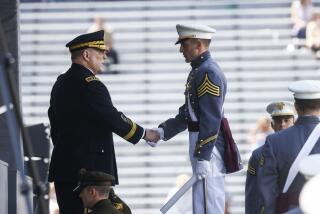Schwarzkopf Views Iraq, Troops, Postwar Gulf
- Share via
RIYADH, Saudi Arabia — Some comments made by Gen. H. Norman Schwarzkopf, commander of Operation Desert Storm, during a recent interview with The Times and in other conversations:
* On comparing the leadership of North Vietnam in the 1960s to Iraq’s today: “I certainly don’t give the Iraqis much credit. Ho Chi Minh and Gen. (Vo Nguyen) Giap didn’t live in luxury, didn’t have seven different palaces, didn’t drive white Mercedes like Saddam Hussein. Hanoi had an entirely different class of leadership.”
* On Iraq’s military capability: “When you added up the numbers of people and numbers of tanks and numbers of airplanes, their capability looked quite good. A good military commander is not going to assume away anything. But I think their capability was probably overblown to begin with.”
* On American soldiers coming to Saudi Arabia: “The world predicted, ‘Oh my goodness, culturally the Americans are really going to step in it over there. There’re going to be drunken soldiers rolling around inside the souk. ‘ It hasn’t happened. The fact that we have culturally respected this area cannot be ignored in the Arab world.”
* On a postwar U.S. military presence in the Gulf: “We made a promise to King Fahd (of Saudi Arabia) at the outset: If you ask us to come, we will come. We have no desire for a permanent base and when you ask us to leave, we will leave. We will respect that promise.”
* On postwar Arab-American relations: “We don’t want to win the war and lose the peace. We have designed our campaign to take this into account. I think when all the evidence comes out--that we did not target civilians, that our intentions were exactly what we stated all along, that we respected regional cultural sensitivities--I think this will stand us in good stead in the Arab world.”
* On postwar stability in the region: “The most important factor to stability and peace in the Middle East is the resolution of the Palestinian question. I’d never go into what that solution should be. I’ll leave that to the diplomats. But this is the major impediment to peace.”
* On commanding men in battle: “Troops have to look at you and know you live by different standards than the average man. The rules you must live by are tougher than the ones that apply to the average human being on the street.”
* On the outcome of the war: “We will win.”
More to Read
Get the L.A. Times Politics newsletter
Deeply reported insights into legislation, politics and policy from Sacramento, Washington and beyond. In your inbox twice per week.
You may occasionally receive promotional content from the Los Angeles Times.










